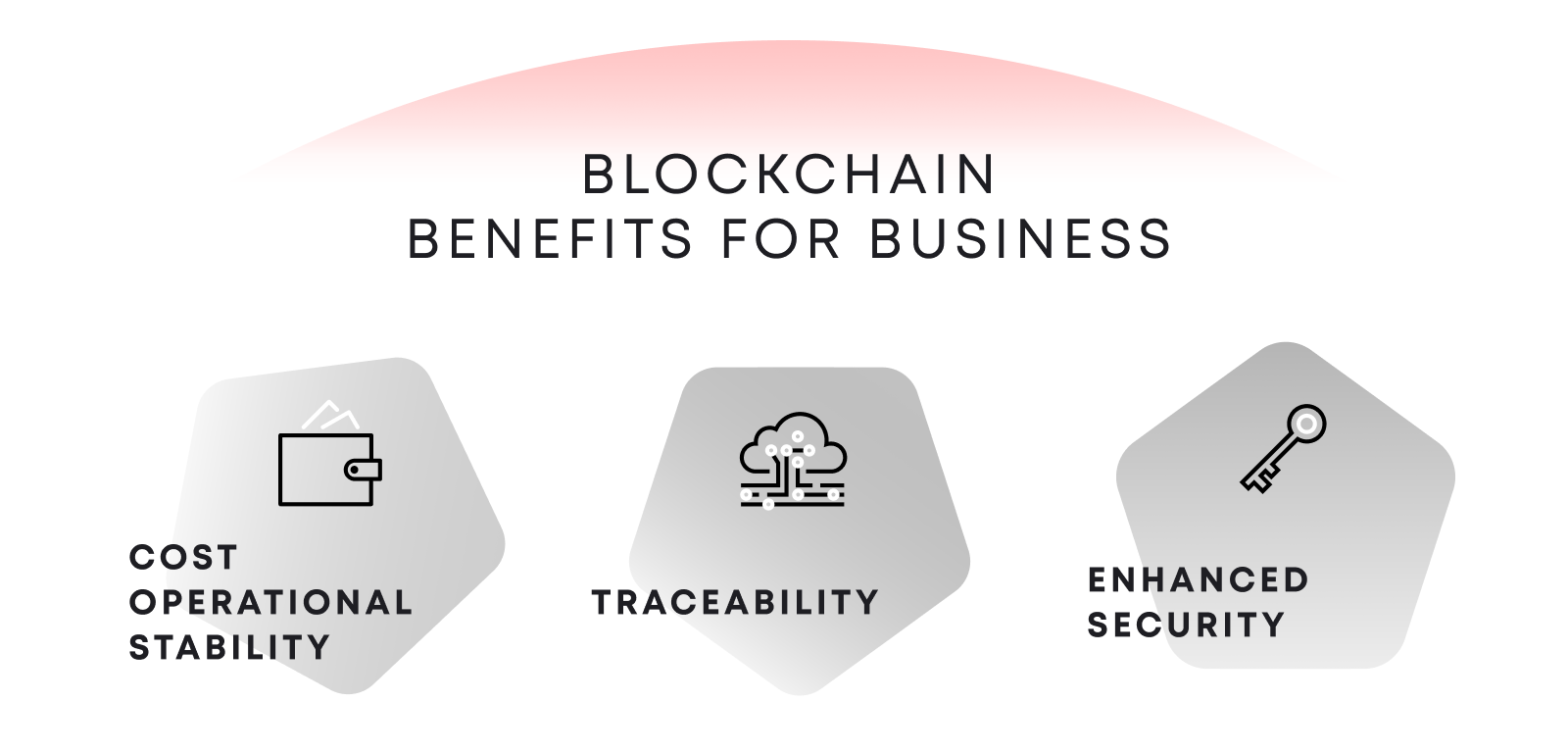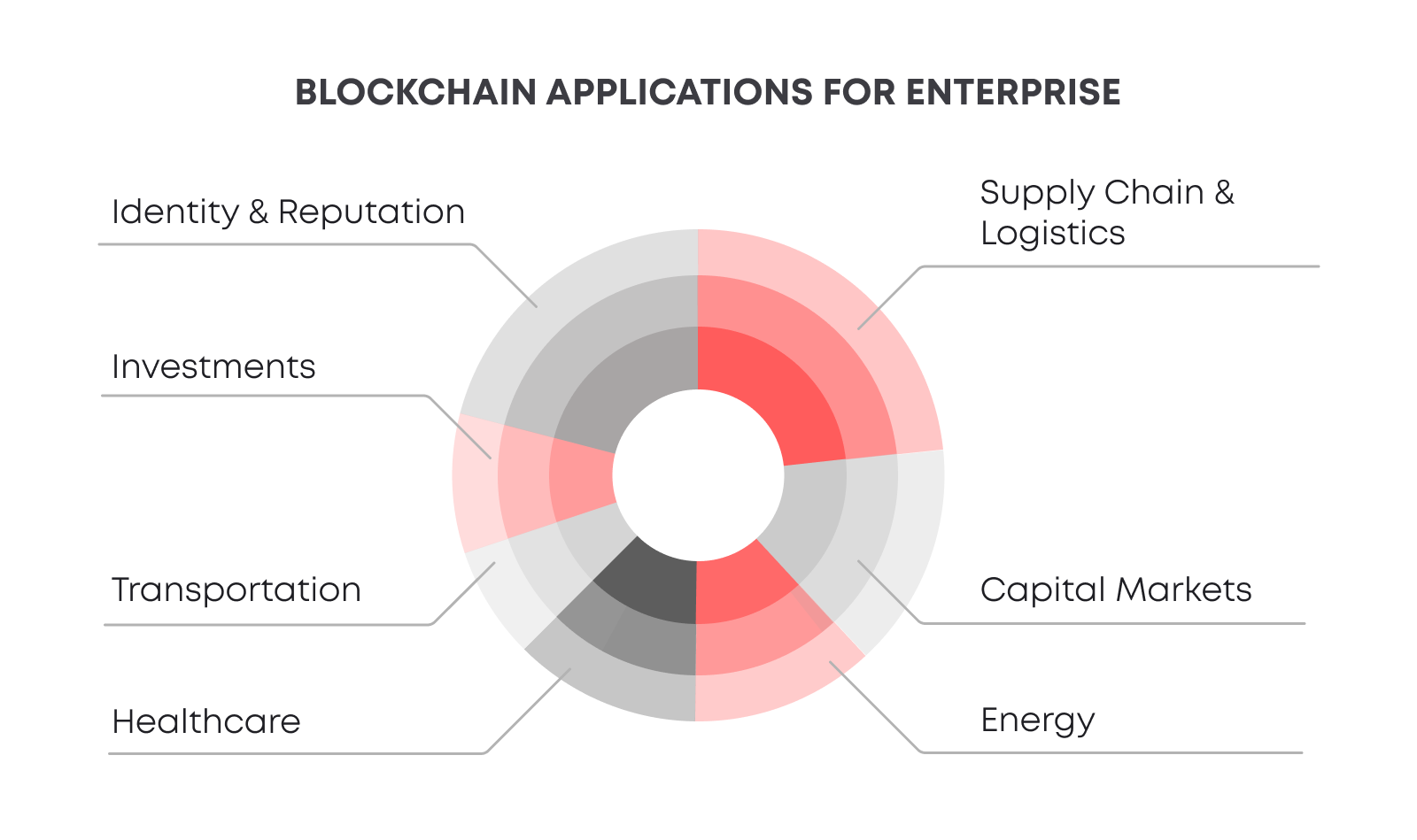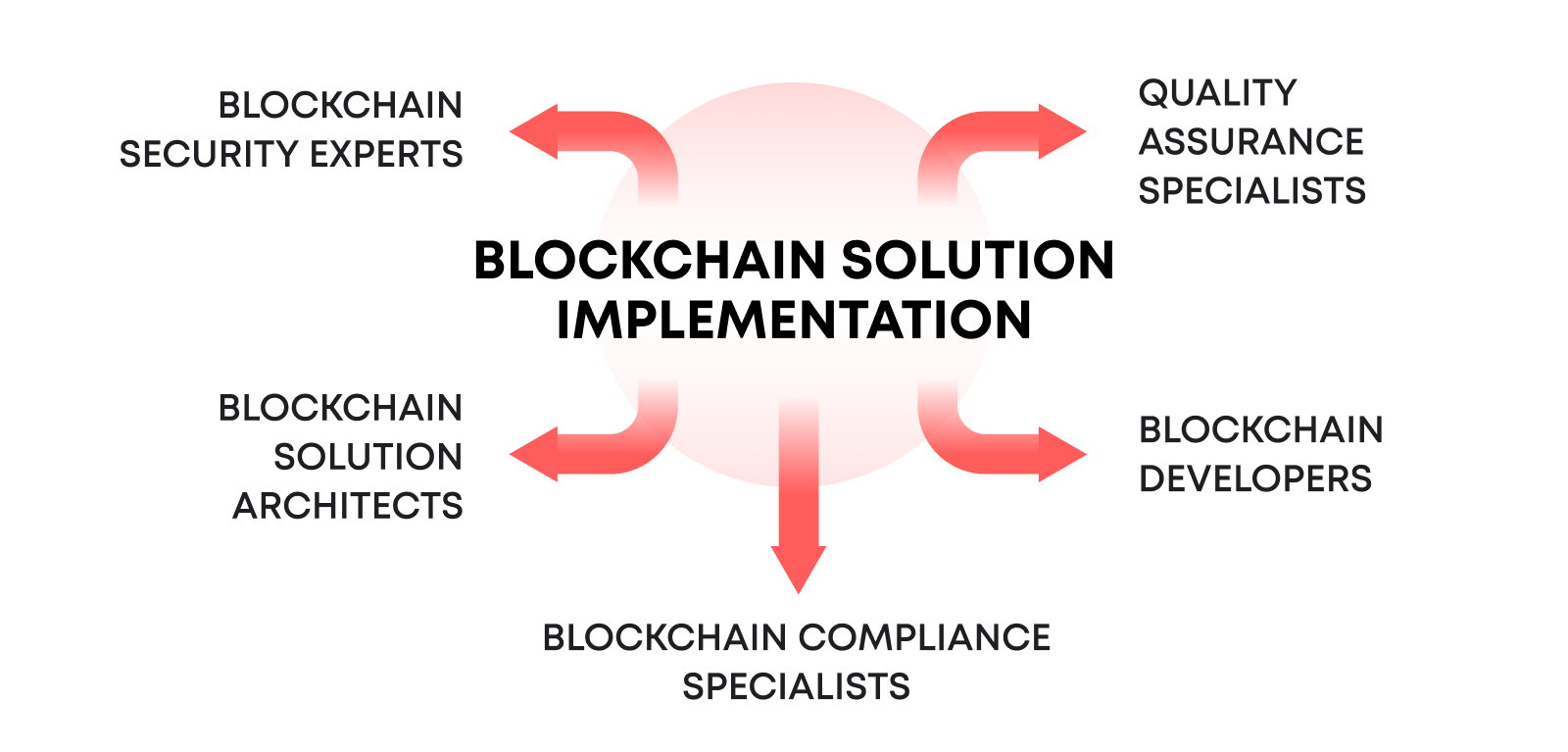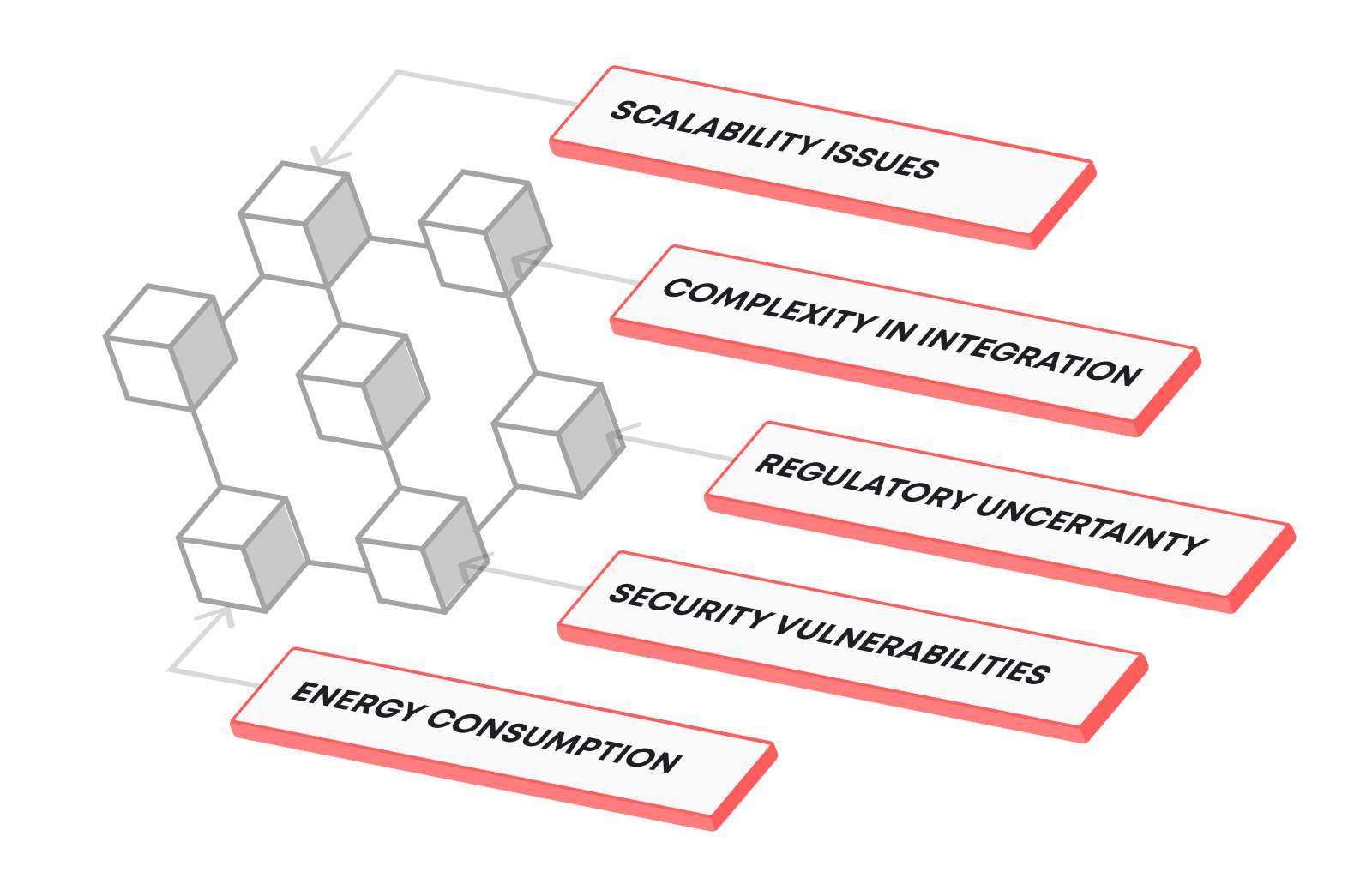Blockchain for Enterprises: Transforming Businesses and Expanding Horizons
Blockchain technology, widely recognized for its association with cryptocurrencies and dynamic startups, presents a different narrative in the enterprise world. Initially, large businesses were cautious about integrating blockchain, a contrast to the rapid adoption by startups who embraced its great potential. Has it always been the right decision?

Major corporations like Bank of America and HSBC, for example, only recently began exploring blockchain to improve transactions, making them more secure and faster. This trend is evident across various sectors, including supply chain and healthcare, where the benefits of blockchain’s transparency and traceability are significant. Yet, many of these enterprises are still in the early stages of adopting MVP solutions, carefully assessing how blockchain fits within their existing operations.
This conservative, methodical approach differs markedly from the startup sector’s agility and willingness to take risks. It underscores the complexities and high stakes of implementing blockchain at the enterprise level. As we explore blockchain for enterprises, it’s clear that while enterprise blockchain adoption may be gradual, the potential for transforming business operations is substantial.
Read More about Blaize’s expertise in developing blockchain solutions for enterprises here.
Understanding Blockchain for Business
The ebbs and flows of Bitcoin and cryptocurrency markets often dominate headlines, but beneath this veneer of volatility lies the steady maturation of blockchain technology. Unlike the fleeting hype of digital currencies, blockchain has consistently proven its value, especially in the realm of enterprise solutions. However, for many large businesses, blockchain still resides in the realm of skepticism, akin to other emerging technologies like Machine Learning, Artificial Intelligence, and Digital Twins. These innovations are often viewed as fascinating yet distant – intriguing for research and development, but not yet ready for full-cycle integration into business operations.
Despite this cautious stance, it’s crucial for enterprises to recognize that blockchain technology has evolved beyond its initial perception. The enterprise blockchain application setting is not merely a futuristic concept; it’s a present-day reality with practical and tangible benefits. This technology offers more than just a platform for cryptocurrencies; it provides a robust framework for enhancing various aspects of business operations, from supply chain management to transactional security.
Blockchain for enterprises is not just a tool for R&D or pilot projects. It’s a viable solution for streamlining processes, enhancing transparency, and ensuring data integrity. Its decentralized nature eliminates single points of failure, making it a resilient and secure choice for businesses. Furthermore, smart contracts, an integral feature of blockchain, automate and enforce contractual agreements, reducing the need for intermediaries and lowering transaction costs.
Businesses that remain skeptical of blockchain’s short-term impact may be overlooking its long-term strategic benefits. In an increasingly digital world, blockchain offers a foundation for building trust, ensuring data authenticity, and facilitating seamless cross-organizational collaboration.
As we venture further into the digital age, it’s clear that blockchain is not just a passing trend but a technology that will shape the future of business. It’s time for enterprises to move beyond suspicion and start actively exploring how blockchain can be integrated into their workflows. The technology is ready and waiting; it’s up to businesses to take the step towards embracing its potential.
Blockchain Benefits for Business
The enterprise blockchain adoption is not just a trend; it’s a strategic upgrade. Its benefits are manifold.
Firstly, it brings unparalleled transparency, allowing every transaction to be traced and verified.
Secondly, it drastically enhances security; the decentralized nature of blockchain makes it nearly impervious to fraud and hacking.
Thirdly, and perhaps most appealingly, it significantly reduces costs by streamlining processes and eliminating middlemen. Other benefits include faster transactions, improved traceability, and the automation of routine tasks.

Blockchain technology, often shadowed by its association with cryptocurrencies, offers a spectrum of tangible benefits for businesses, especially when implemented with a strategic approach. Understanding these advantages can help enterprises unlock their full potential. Let’s take a closer look at the following key benefits: Cost Operational Stability, Traceability, and Enhanced Security, each playing an essential role in modern business operations.
Cost Operational Stability
Blockchain technology excels in providing operational stability while simultaneously reducing costs, a dual advantage crucial for any enterprise. By automating and streamlining traditional processes, especially in areas like supply chain management and financial transactions, blockchain reduces the need for intermediaries, leading to significant cost savings. For instance, smart contracts automatically execute transactions based on predefined criteria, eliminating delays and reducing manual intervention. This automation not only cuts costs but also enhances the efficiency and reliability of business operations, contributing to overall operational stability.
Traceability
In an era where supply chain transparency is not just valued but demanded, blockchain offers unparalleled traceability. Each transaction on a blockchain is recorded with an immutable timestamp and details, providing a transparent and verifiable trail. This feature is particularly beneficial in industries where the authenticity and origin of products are critical, such as pharmaceuticals and luxury goods. By leveraging blockchain, businesses can track the journey of a product from production to delivery, ensuring authenticity and building trust with consumers.
Enhanced Security
One of the most significant advantages of blockchain is its robust security framework. The decentralized nature of blockchain makes it inherently resistant to fraud and cyber-attacks, as altering data on one block would require altering subsequent blocks across all copies of the ledger, a near-impossible feat. This security aspect is vital for enterprises handling sensitive data, such as financial institutions and healthcare providers. Blockchain’s cryptographic encryption further fortifies data integrity, ensuring that sensitive information remains protected and confidential.
Blaize knows how to realize these benefits for an enterprise of any domain to accelerate your business growth. Discover more details about our relevant solutions here.
Blockchain technology offers more than just a platform for digital currencies; it provides a transformative solution for businesses seeking cost-operational stability, traceability, and enhanced security. As enterprises increasingly recognize these benefits, blockchain is set to become a fundamental component of modern business infrastructure, driving innovation and efficiency across various sectors.
Blockchain Applications for Businesses
Blockchain technology has forged a path into the business world, offering bespoke solutions across various industries. The applications of blockchain for enterprises are as diverse as they are transformative, proving that this technology extends far beyond its origins in cryptocurrency. Let’s explore how different sectors are harnessing blockchain to address their unique challenges, using real-world examples to illustrate the practical impact.
| Industry: | Use case: | Example: |
| Investments | Asset management | BlackRock, the global asset management leader, has been actively exploring a blockchain strategy for Aladdin, its premier investment management platform managing nearly $9 trillion. The firm seeks to assess various blockchain protocols to enhance Aladdin, which stands as the cornerstone for risk assessment and trade execution in modern finance. |
| Transportation | Traceability | The Blockchain in Transport Alliance (BiTA) is shaping the future of transportation and logistics through blockchain technology. BiTA’s efforts ensure more efficient, transparent, and secure transportation operations, enabling companies to better track shipments and manage fleets. This transformative approach is leading to innovative solutions like TradeLens, developed by Maersk and IBM, which significantly optimizes global trade and supply chain processes |
| Healthcare | Tracking & Record Keeping, Traceability | IBM and Moderna have partnered to explore advanced technologies for improving the tracking of COVID-19 vaccines. The collaboration aims to enhance supply chain management and provide real-time tracking to ensure the efficient and secure distribution of vaccines globally. The companies will explore improved information sharing among governments, health care providers, life science organizations and individuals through AI, blockchain and hybrid cloud. |
| Supply Chain & Logistics | Traceability, Supply Chain Management | PepsiCo’s “Project Proton” blockchain trial, leveraging Zilliqa’s blockchain platform, resulted in a substantial 28% increase in supply chain efficiency. This initiative aimed to resolve programmatic advertising challenges, showcasing how smart contracts can enhance transparency and cost-effectiveness. The trial demonstrated the potential for blockchain to optimize advertising campaigns and supply chain reconciliation in real-time. Encouraged by these results, PepsiCo plans to extend their exploration of blockchain’s capabilities in future campaigns. |
| Capital Markets | Clearing & Settlement | Bank of America has enhanced its stock trade settlement process by joining the Paxos Settlement Service, utilizing blockchain technology to finalize trades in a matter of minutes instead of days. This initiative marks a significant step in the financial industry’s embrace of blockchain, with Bank of America becoming a notable member alongside Credit Suisse and Nomura Holdings’ Instinet on the Paxos network. |
| Identity & Reputation | Identity Management & Verification | Google and Hyperledger have introduced innovative online identity management tools designed to enhance security and user control. Google’s BeyondCorp Enterprise offers secure identity and access management for employees, partners, and customers, while Hyperledger Indy utilizes blockchain for a decentralized approach, allowing for secure and private credential verification. These tools empower users with self-sovereign identities, giving them control over their data and facilitating secure mobile access for a variety of corporate applications. |
| Energy | Сarbon Credits | Tokenization of carbon credits involves representing real-world carbon credits as digital tokens on the blockchain. This process enhances the carbon market’s efficiency by allowing credits to be sold, transferred, or retired more seamlessly. The Toucan Protocol is an example of a platform facilitating this tokenization, which can improve liquidity, enable better price discovery, and reduce the risk of double-counting. It also opens up carbon markets to a broader audience, enabling individuals with a crypto wallet to participate, as opposed to the traditional market, which is generally accessible only to corporate entities via brokers |
Integrating blockchain into a business starts with a clear understanding of its potential and aligning it with business objectives. The next steps involve choosing the right platform and planning the implementation process. It’s about taking a measured, strategic approach to harness the transformative power of blockchain.
The current landscape of business transactions is often characterized by disjointed data repositories. Organizations traditionally keep individual data copies due to a lack of mutual trust, leading to both data security vulnerabilities and operational inefficiencies.
To address the challenges of siloed data, companies have historically looked inward, focusing on initiatives like data stewardship, master data management, security audits, and data format standardization. However, these efforts frequently overlook the broader picture: data doesn’t just stay within one organization; it flows across a network of businesses, suppliers, financial institutions, insurance companies, and public entities, creating interdependencies.
Here, enterprise blockchain becomes a game-changer. It serves as a shared, trusted ledger, accessible to a consortium of companies and selected third parties. This ledger isn’t controlled by any single entity but is collectively managed by the consortium members. They collaboratively ensure that the information is continually updated, maintaining a consistent, immutable database.
What does this database contain? Essentially, it’s a record of various types of digital transactions pertinent to each consortium member. Blockchain shifts the paradigm from focusing on internal data management to digitizing, automating, and securing data across multiple organizations. The impact goes beyond optimizing individual companies to transforming entire industries and supply chains.
Discover more details on how Blaize developed a blockchain data hub for R-Dee’s integrated health IT suite.

At Blaize, we are at the forefront of consulting with companies and public institutions keen on embracing blockchain-driven innovations. Our expertise lies in guiding these organizations through the complexities of blockchain integration, ensuring they leverage this technology to its fullest potential. We provide insights into our methodologies, ongoing projects, and thought leadership in the field through our extensive range of technical papers and articles. We encourage you to delve into these resources to understand how blockchain is revolutionizing the way businesses operate.
Roles and Specialists Needed for Blockchain Implementation
For enterprises looking to implement blockchain technology, particularly those concerned with its security and performance, the need for specialized roles and expertise is paramount.
Blaize.Security stands out as a world-class blockchain security company, specializing in various aspects of web3 security. Blaize expertise encompasses smart contract audits across multiple programming languages, and audits for different blockchain platforms like Solana, Near, Secret Network, and Aptos. With over 6 years of experience, Blaize.Security has successfully completed more than 145 crypto projects, demonstrating a deep commitment to building a safe environment for blockchain ecosystems.
Discover more details about Blaize.Security solutions in the web3 security field.
Blaize, primarily specializing in web3 security domain, has deep and wide expertise and world-class performance in developing highly secure, hard-to-hack blockchain solutions. This requires a team of specialists with specific skills:
- Blockchain security experts: Individuals who specialize in blockchain security, capable of conducting rigorous audits and ensuring the resilience of the blockchain against breaches and hacks.
- Blockchain developers: Skilled in various blockchain platforms, these developers are essential for creating robust, secure applications. Their expertise is crucial in building solutions that not only meet business needs but also adhere to the highest standards of security.
- Blockchain solution architects: Responsible for designing the overall blockchain system, these architects must have a deep understanding of both blockchain technology and the business’s specific requirements to ensure that the architecture is secure, efficient, and scalable.
- Quality assurance specialists: Experts in testing blockchain solutions to identify vulnerabilities and ensure the integrity and performance of the application before it goes live.
- Blockchain compliance specialists: Given the evolving regulatory landscape around blockchain, these specialists ensure that all solutions comply with relevant laws and regulations, reducing legal risks associated with blockchain implementation.

By focusing on these roles, Blaize emphasizes its commitment to security and performance in blockchain solutions, addressing the main concerns of businesses regarding trust in blockchain technology.
Blockchain Pitfalls
While the benefits are significant, so are the challenges. Businesses must navigate the complexities of technology integration, regulatory landscapes, and security concerns. Blaize, with its focus on enterprise blockchain development, provides the expertise to overcome these challenges, ensuring a smooth transition to blockchain technology. Key challenges include:
- Complexity in integration: Implementing blockchain into existing systems can be technically complex, requiring specialized knowledge and resources.
- Scalability issues: Blockchain networks, particularly those employing Proof of Work, can face scalability issues, affecting transaction speed and efficiency.
- Regulatory uncertainty: The regulatory landscape for blockchain is still evolving, posing compliance risks.
- Security vulnerabilities: While blockchain is inherently secure, smart contracts and other applications are susceptible to vulnerabilities.
- Energy consumption: Some blockchain models, like those based on Proof-of-Work, are criticized for high energy consumption.
Addressing these pitfalls demands a partnership with a knowledgeable and experienced blockchain solutions provider.

Companies like Blaize, with their proven expertise in developing secure and efficient blockchain solutions, are well-equipped to mitigate these challenges. Their focus on thorough blockchain security audits and commitment to staying abreast of regulatory changes positions them as a reliable partner in navigating the complexities of blockchain implementation.
Afterword
It’s clear that blockchain for enterprises is not just a technological leap but a strategic revolution. Enterprise-grade blockchain is transforming from a niche innovation to a mainstream solution, offering versatile and robust blockchain enterprise solutions that redefine operational efficiency and transparency. The journey of enterprise blockchain development is accelerating, with a plenty of blockchain enterprise use cases emerging across various industries.
Our advice to businesses is to embrace flexibility and decisiveness in implementing new blockchain solutions. It’s essential to explore these innovative avenues to reach new horizons and achieve groundbreaking goals. However, this journey should be undertaken with specialists who possess expertise not only in developing but also in implementing highly secure solutions. Companies like Blaize stand at the forefront of this field, offering enterprise blockchain applications that are not only innovative but also prioritize security and reliability.
Blaize experience in developing and implementing secure and efficient enterprise solutions lets us cover any domain. Click here to set a call with Blaize specialists.The promise of blockchain in the enterprise domain is vast, offering innovative solutions to traditional business challenges. With the continuous growth and development in enterprise blockchain adoption, businesses are poised to unlock new potentials and opportunities, ensuring long-term value and impact in the ever-evolving digital landscape.
